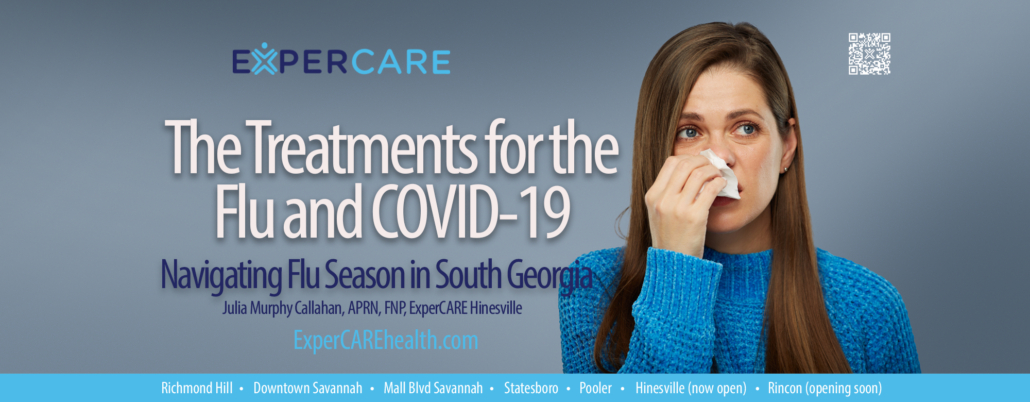
Understanding the Differences Between COVID-19 and the Flu
Julia Murphy Callahan, APRN, FNP, ExperCARE Hinesville
Here’s why it matters
Different Treatments: The treatments for the flu and COVID-19 differ. Antiviral medications like oseltamivir (Tamiflu) are available for the flu, while COVID-19 may require specific treatments like monoclonal antibodies or antiviral medications like remdesivir in more severe cases. Early diagnosis ensures timely initiation of the appropriate treatment.
Isolation and Contact Tracing: Early diagnosis allows for quick isolation of the infected individual and contact tracing to prevent further spread of the virus. This is crucial in controlling the spread of COVID-19.
Peace of Mind: Knowing whether you have the flu or COVID-19 can provide peace of mind and reduce anxiety about your health and potential exposure to others.
Choosing Urgent Care Over the ER: During flu season, healthcare facilities can become crowded, increasing the risk of exposure to illnesses. Here’s why you might consider visiting an urgent care facility like Expercare instead of a heavily populated ER:
Lower Wait Times: Urgent care centers typically have shorter wait times than emergency rooms, allowing you to receive care more quickly.
Reduced Exposure: Urgent care centers are often less crowded than ERs, which can help minimize your risk of exposure to infectious diseases.
Expertise: Expercare’s experienced staff are well-trained to diagnose and treat a wide range of illnesses, including the flu and COVID-19, providing you with the care you need.
Community Focus: As a community urgent care provider, Expercare has a vested interest in the well-being of the local community. They can offer insights into the prevalence of flu and COVID-19 in the area, helping you stay informed.
Conclusion:
Navigating flu season in South Georgia requires a keen understanding of the differences between COVID-19 and the flu. Quick and accurate diagnosis is key to effective treatment and reducing the risk of transmission. Expercare, with its experienced staff and community focus, can provide you with the care you need while minimizing exposure.
Whether you’re experiencing flu-like symptoms or are concerned about COVID-19, seeking care at an urgent care facility like Expercare is a smart choice during these uncertain times.
Stay informed, stay safe, and prioritize your health and the health of your community this flu season.
OUR SERVICES
When it comes to medical care, routine or urgent, you want the comfort of a familiar face, a warm smile and the convenience of being seen the same day, after hours, or weekends. ExperCARE is locally owned and operated and employs the very best team in the industry. Our commitment to you is something we take to heart, ensuring we provide the very best experience for you and your loved ones. The synergy of expertise, compassion, and convenience are why our customers continue to recommend and return for their healthcare and peace of mind. We welcome the opportunity to exceed your expectations while providing access to the very best healthcare experience in the region when you need it.
Urgent Medical Care Services ı Routine Care ı COVID-19 Testing & Treatment ı Labs, X-rays, Diagnostics ı Occupational Medicine ı On-Site Services ı Immigration Services
6 CONVENIENT LOCATIONS
ExperCARE offers comprehensive care across its locations, including Richmond Hill, Pooler, Statesboro, Hinesville. two locations in Savanah, one at Savannah on Mall Blvd and the other in the Savannah Historic District Downtown. A new office is also opening soon in Rincon. Each location ensures consistent, high-quality healthcare services.
Each location is within a 25-minute drive of an ExperCARE facility, reflecting the our commitment to providing convenient and quality care.







 Summer is here and it’s time to enjoy the great outdoors! But before you head out, it’s important to take precautions and protect yourself from the harmful effects of UV rays. Here are some ExperTIPS to keep in mind:
Summer is here and it’s time to enjoy the great outdoors! But before you head out, it’s important to take precautions and protect yourself from the harmful effects of UV rays. Here are some ExperTIPS to keep in mind: